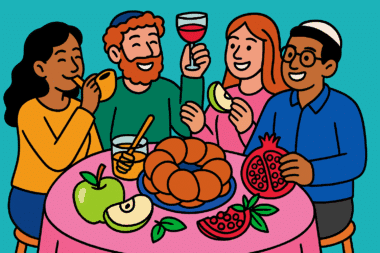This may sound like an odd thing to say, but I’m gonna say it anyway: One of the very best weeks of my life was the week my family sat shiva for my dad. Of course it was sad and painful and full of grief. That goes without saying. So why do I say it was such a good week?
First of all, because I was able to share it with my mom and my brothers–it was really deep time together, with a lot of photos and stories and memories. But another reason that’s just as important is that the house was full of visitors: old friends of my parents, of course, but also my own friends and friends of my brothers, and even people in our community who didn’t know us but simply showed up to offer condolences. People brought food. They helped to make a minyan in our home. They just showed up. And the result was this overwhelming sense of being cared for, this really really thick experience of community, which helped us make our way through tremendous loss.
Whether they were conscious of it or not, what all these people were doing was living out one of the Torah’s most important instructions: v’ahavta l’reiakha komokha, love your neighbor as yourself. And in this tenth and final episode in our series on ethical mitzvot, that’s what I want to focus on.
It’s a strange mitzvah, this commandment to love. If love is a feeling, then it seems a little wrong for the Torah to command us to feel it. I mean, how are you supposed to just summon a feeling, much less a feeling as strong as love? (A lot of rabbis point out that this is, perhaps, precisely why the Torah instructs us to honor our parents, but not to love them—because we can control our behavior, but not our emotions.)
A couple of the classical commentators on the Torah can help us out here. Abraham Ibn Ezra suggests that what the verse really means is that we should want what’s good for our neighbor—not that we have to love love them, but simply that we’re a mensch: We wish them well, and, basically, we don’t behave like a jerk towards them.
Rabbi Moshe ben Nachman, known as Nachmanides or Ramban, goes in a similar direction, but says a little more: We should want what’s good for our neighbor all the time. What does that mean? He points out that we can experience a natural human tendency to be a little jealous, to feel generous towards other people about some things but not others. Like if we were kids comparing grades on a test in school: I say out loud, “I’m so happy you got an A!” But I say to myself, “I hope you didn’t get a higher grade than I did.” Ramban understands the mitzvah here as going the distance: Because of my love for you, I want you to do as well as you can—really, truly I do.
In the context of our series here on Soulful Jewish Living, I want to suggest a third reading, which is that loving our neighbors as ourselves can also just mean showing up when other human beings need us: Show up for the family asking for help outside the drugstore; show up for the person who’s feeling alone; show up to the shiva house to offer condolences.
I think we can think of this mitzvah as a kind of bookend to our very first teaching: that human beings are created btzelem elohim, in the Divine image. It’s basically putting that idea into practice—and that means it’s a kind of foundation for all of these other mitzvot we’ve talked about: welcoming guests, visiting the sick, giving tzedakah, returning lost objects, mindful speech, mindful feedback, and honoring elders. All of them have their roots in the idea of tzelem elohim. And all of them are ways we express loving our neighbors as ourselves—because, as my own story about shiva illustrates, that’s how we want to be treated and cared for, too.
So to close out this miniseries, I want to go back to where we started, which is our meditation practice on tzelem elohim. I hope you’ll join me.
Begin with three good deep breaths.
Let your body arrive.
Let your mind settle.
Let your attention rest on your breath. In and out.
And now, on the outbreath, you can say to yourself, “I am absolutely unique.”
On the next outbreath, you can say, “I am infinitely valuable.”
And on the third outbreath, you can say, “I am equal to everyone.”
Now bring to mind someone you’re close to, someone you love and care about. And direct the same words to them:
“You are absolutely unique.”
“You are infinitely valuable.”
“You are equal to everyone.”
And now, bring to mind someone you don’t know well—maybe a neighbor you pass occasionally, or someone at work or school. Say the same words about them.
“You are absolutely unique.”
“You are infinitely valuable.”
“You are equal to everyone.”
And finally, see if you can bring to mind someone who is perhaps even on the other side of one of those divides we talked about—culturally, politically, or otherwise. See if you can say the same about them.
“You are absolutely unique.”
“You are infinitely valuable.”
“You are equal to everyone.”
Keep breathing, and notice how you feel. Perhaps a bit lighter and more open. Perhaps a bit more connected, and a little more ready to receive and do good deeds in the world.
There are three places that the Torah instructs us to practice love. One of them is what we talked about today: loving our neighbors as ourselves. Another is the commandment to love the stranger, for we were strangers in the land of Egypt. And the third is the commandment to love the Holy One, the Divine, with our entire heart, soul, and being. And the thing is, they’re all really the same commandment: To love God is to love ourselves, to love our neighbors, and to love strangers—to show compassion and goodwill toward all beings. I hope this miniseries helps all of us to manifest that a little more in the world.
Blessings for the journey. Know that I’m on it with you.





